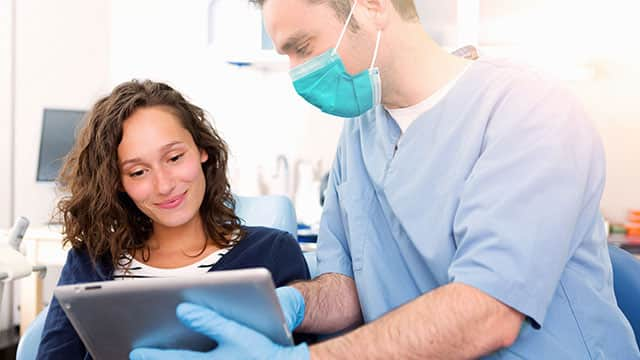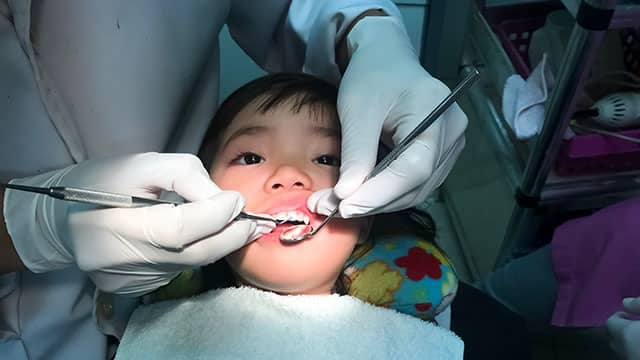Does chemotherapy affect your teeth?
Chemotherapy can affect your teeth and other places in your mouth. Although chemo effectively kills cancer cells, it may also harm or kill healthy cells. If the chemotherapy medicines harm cells in your mouth such as your teeth, gums, or saliva glands, side effects can include:
- Painful teeth or gums
- Loose teeth in children
- Difficulty swallowing, also known as dysphagia
- Mouth sores
- Trismus, also known as lockjaw
- Changes in taste
Chemotherapy causes other side effects in children undergoing chemotherapy. Problems with baby teeth are typical. Permanent teeth may be slow to come in and may look different from healthy teeth. Baby teeth may fall out prematurely. Speak to your dentist before your child starts treatment; your dentist can examine your child's teeth for any problems throughout the process.
Taking care of your teeth during chemotherapy
When undergoing chemotherapy, proper oral hygiene is crucial. Your body can't fight off infection as well as it used to, so ensuring your mouth is clean and teeth are healthy can help keep you healthy.
- Brush your teeth, gums, and tongue twice a day
- Use a fluoride toothpaste
- Rinse your mouth with a saltwater solution to clear bacteria
- Clean between your teeth gently daily with interdental brushes, floss, or water flossers
- Use an antiseptic mouth rinse twice daily
- Stay hydrated to fight dry mouth
If your gums or teeth feel sore, you may need to change what you eat and drink. Eat foods that are soft, easy to chew, and easy to swallow, like mashed potatoes or scrambled eggs. Take small bites and drink water with your meals to help you swallow and chew. Avoid crunchy and sharp foods like chips or sugary foods that can cause cavities.
Managing Dry Socket Pain
The primary treatment for a dry socket is pain management. In addition to the dry socket paste, your dentist may prescribe painkillers and send you home with directions on using ice packs and rinse gently with a saltwater solution. You still need to maintain good oral hygiene, so be particularly careful when using a toothbrush.
Other oral side effects of chemotherapy and radiation
Trismus, also known as lockjaw, is a common side effect among people undergoing oral cancer treatment. Trismus limits the amount of motion in your jaw, making it difficult to eat or talk. Around 30 percent of patients who receive chemoradiation treatment experience trismus. Trismus can be difficult, but it is often temporary and will go away after treatment.
Another common chemo side effect that affects your mouth is difficulty swallowing, known medically as dysphagia. Your dentist can help treat dysphagia, especially if it's caused by dry mouth. Regularly rinsing your mouth can help keep your mouth clean and can help with swallowing.
If thickened saliva is causing the difficulty, your dentist may recommend prescription products or artificial saliva combined with drinking water throughout the day to help with thickened saliva and dry mouth. Avoiding things that can make your mouth drier, such as caffeine, tobacco, and alcohol, will also help.
How Severely does Chemotherapy Affect Teeth?
Side effects of chemotherapy can vary in severity. Sometimes they are annoying and will go away shortly after finishing chemo. However, if side effects aren't treated, they can lead to infection. During cancer treatment, your body cannot fight off infection, so infections can be even more severe and delay your cancer treatment.
Talk to your Dentist about Side Effects
Tell your dentist you are starting chemotherapy at least two weeks before treatment. Your dentist will be able to educate you on possible side effects, keep up with any changes in your oral health, and quickly treat any side effects. When you go to the dentist, your dental hygienist and dentist can do the following:
- Examine your teeth and gums
- Take X-rays
- Create a treatment plan for any pre-existing oral issues
- Keep you on a regular schedule of appointments to maintain your oral health throughout your cancer treatment
Inform your dentist at least two weeks before chemotherapy, and follow all care suggestions from your dentist and oncologist to help treat side effects and keep your mouth healthy during cancer treatment.
This article is intended to promote understanding of and knowledge about general oral health topics. It is not intended to be a substitute for professional advice, diagnosis or treatment. Always seek the advice of your dentist or other qualified healthcare provider with any questions you may have regarding a medical condition or treatment.
ORAL HEALTH QUIZ
What's behind your smile?
Take our Oral Health assessment to get the most from your oral care routine
ORAL HEALTH QUIZ
What's behind your smile?
Take our Oral Health assessment to get the most from your oral care routine















